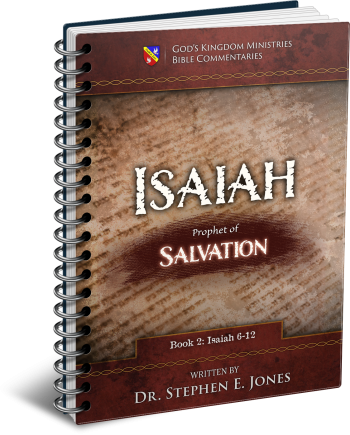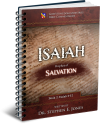Latest Posts
View the latest posts in an easy-to-read list format, with filtering options.

Isaiah is the prophet of Salvation. He is also known as the truly "Universalist" prophet, by which is meant that He makes it clear that salvation is extended equally to all nations and not just to Israel. He lived to see the fall of Israel and the deportation of the Israelites to Assyria, and he prophesied of their "return" to God (through repentance). He is truly a "major prophet" whose prophecies greatly influenced the Apostle Paul in the New Testament.
Category - Bible Commentaries

Ahaz was worried that his throne would be taken by Rezin, king of Syria. Isaiah, however, saw the deeper issue was that the house of David was being threatened. God’s covenant with David was being challenged, and with it was the danger that there would be no future Messiah. The prophet told the king that Ephraim-Israel as a nation would cease to exist within 65 years. No doubt Isaiah also told Ahaz that he would not be overthrown or killed.
King Ahaz probably did not believe the word of the prophet, so it was then affirmed by a sign. Isaiah 7:10, 11 says,
10 Then the Lord spoke again to Ahaz, saying, 11 “Ask a sign for yourself from the Lord your God; make it deep as Sheol or high as heaven.”
The Lord did not speak directly to Ahaz but through Isaiah. Though the king was given the opportunity to ask for any sign at all, his disbelief caused him to try to put off the prophet. Isaiah 7:12 says,
12 But Ahaz said, “I will not ask, nor will I test the Lord!”
The king self-righteously appealed to Deut. 6:16,
16 You shall not put the Lord your God to the test, as you tested Him at Massah.
Ahaz knew just enough of the law to be dangerous. Without knowing God Himself, he could quote the law but use it in a way that was contrary to the will of God. God does give signs to confirm His word. The only problem comes when we require signs in order to believe the word. When signs become the basis of our faith, it is indeed a problem. But at the same time God always confirms His word by the law of two or three witnesses.
Signs are not the cause of faith. Signs are a witness that support our faith after we believe the word of Christ (Rom. 10:17).
Isaiah 7:13, 14 continues,
13 Then he [Isaiah] said, “Listen now, O house of David! Is it too slight a thing for you to try the patience of men, that you will try the patience of my God as well? 14 Therefore the Lord Himself will give you a sign: Behold, a virgin will be with child and bear a son, and she will call His name Immanuel.
This was a messianic prophecy, as we learn from Matt. 1:20-23,
20 But when he [Joseph] had considered this, behold, an angel of the Lord appeared to him in a dream, saying, “Joseph, son of David, do not be afraid to take Mary as your wife; for the child who has been conceived in her is of the Holy Spirit. 21 She will bear a Son; and you shall call His name Jesus, for He will save His people from their sins.” 22 Now all this took place to fulfill what was spoken by the Lord through the prophet: 23 “Behold,, the virgin shall be with child and shall bear a Son, and they shall call His name Immanuel,” which translated means, “God with us.”
Hence, when Jesus was begotten in a virgin by the Holy Spirit (Matt. 1:18), it fulfilled Isaiah’s prophetic sign that was given to the house of David—specifically, to King Ahaz. But in the time of Ahaz, the immediate sign was actually fulfilled in the birth of his grandson, Manasseh. The circumstances of Manasseh’s birth were recorded in 2 Kings 20 in the story of Hezekiah, who was the son of Ahaz.
Recall that Manasseh was a type of the remnant, according to Isaiah’s prophecy in 2 Kings 19:30. Manasseh’s mother was Hephzibah (2 Kings 21:1), who was also a prophetic type and sign of the restored Kingdom (Isaiah 62:4, KJV).
When this sign was given to Ahaz, Hezekiah was still quite young and probably was unmarried. Hezekiah came to the throne at the age of 25 (2 Kings 18:2). We do not know when he married Hephzibah, but it is likely that she was just a child when the prophecy was given to Ahaz. So the Hebrew word used to describe her is almah, a general word that can mean either a young woman or a virgin. No doubt she was a virgin at the time of the prophecy given to Ahaz.
When Ahaz later died, Hezekiah came to the throne and reigned 29 years. This included a 15-year extension on his life (2 Kings 20:6). Hence, he became deathly sick after reigning just 14 years, and three years later Hephzibah gave birth to Manasseh.
Hezekiah’s son Manasseh was 12 when his father died (2 Kings 21:1). We do not know when Hezekiah married Hephzibah, but obviously, she was not a virgin when she gave birth to Manasseh. Manasseh was born naturally. Yet signs are prophetic of greater things to come. In this case, Hephzibah was a sign fulfilled later by Mary in a greater way, while Hezekiah himself, who fathered Manasseh, was a type of God, who later fathered Jesus Christ through Mary.
Manasseh himself was a type of the remnant of grace, but in that he was of the house of David whose lineage led to Christ, he also served as a type of Christ. For this reason, though he held the scepter of Judah, he was named after the son of Joseph, to whom had been given the birthright (1 Chron. 5:1, 2). This suggests the merging of the two sticks that would ultimately reunite the two kingdoms back under the headship of Christ (Hosea 1:11).
The birthright was primarily the Fruitfulness Mandate of Gen. 1:28. Joseph was thus “a fruitful bough” (Gen. 49:22). The word translated “bough” is ben, “a builder (of the family tree), a son.” Ephraim, “double portion of fruit,” received the birthright, but Manasseh also prophesied through his name.
Manasseh means “forgetfulness,” so named because, as Joseph said in Gen. 41:51, “God has made me forget all my trouble and all my father’s household.” Joseph himself had been taken into captivity to Egypt, and his father’s household presumed that he was dead and gone forever. Hence, they had “forgotten” him. Years later, the house of Israel would be taken to Assyria, where they became the “lost tribes of Israel.” They were lost because God caused them to be “forgotten” to fulfill the prophecy of Manasseh’s name.
All of this plays into the sign of Manasseh, son of Hezekiah, because the remnant was to return (Isaiah 10:21). The nation was cast out, but the remnant still carried the seeds of the birthright and were still “chosen” as “the remnant according to God’s gracious choice” (Rom. 11:5). Obviously, the King of that remnant is Jesus Christ.
The birthright could not be fulfilled apart from the scepter. The remnant cannot be fruitful in bringing forth the sons of God unless they have the authority of the Dominion Mandate to do so. Neither could the scepter be fruitful in bringing forth the remnant. The scepter of Judah could only bring forth the Messiah; only the birthright could bring forth the remnant.
The reunification of the two mandates of heaven was to come about through the two comings of Christ, first of Judah and the second time of Joseph, when Christ comes with His robe dipped in blood (Gen. 37:31; Rev. 19:13).
When the angel appeared to Joseph in a dream, he told Joseph to name the child Jesus, or Yeshua, “salvation,” because “He will save His people from their sins” (Matt. 1:21). Yet Jesus’ birth was said to fulfill Isaiah’s prophecy that “they shall call His name Immanuel” (Matt. 1:23).
It seems strange that the angel would instruct Joseph to call the child by a different name. Yet both names were prophetic in different ways. Jesus (Yeshua) was the name that described His mission at His first appearance, for He was called to die on the cross to save the world. On the other hand, Immanuel is the prophetic name that describes the purpose of His second coming.
Immanuel, “God with us,” is pictured in Rev. 21:1-3, when the New Jerusalem comes down out of heaven as a bride. Heaven and earth are pictured in a marriage relationship. Hence, “God with us” is explained in terms of God dwelling with mankind in a cosmic household, where heaven and earth are in agreement and unity, as prophesied in Gen. 2:24,
24 For this reason a man shall leave his father and his mother, and be joined to his wife, and they shall become one flesh.
Notice that this original marriage does not tell the woman to leave her father and mother to dwell with Him. Instead, He is the One who leaves His father and mother to be joined with his wife. So also, Christ came down from heaven, leaving His heavenly Father to live with His wife on earth. The modern “rapture” teaching reverses the order of this marriage prophecy, claiming incorrectly that the bride of Christ must leave the earth and go to heaven to dwell with Him there.
Rev. 21:3 says, “behold, the tabernacle of God is among men, and He will dwell among them.” This asserts that Christ will leave His Father and “be joined to His wife” here on earth. Many Christians, however, have been told that it is the reverse, that men will tabernacle with God in heaven. Rev. 5:10, however, confirms the truth, saying,
10 You have made them to be a kingdom and priests to our God; and they will reign upon the earth.
The purpose of Christ’s second coming, then, is to fulfill the prophecy of Immanuel, “God with us,” or “God among us.” In this case, God is Jesus Christ, “the only-begotten God” (John 1:18) and the “God” who was “with the God” (John 1:1), as the Greek text actually reads. Whereas Isaiah 7 does not distinguish or clearly separate Jesus’ ministry from that of Immanuel, this is clarified in the New Testament.